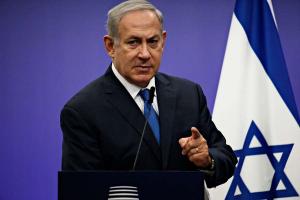We ask you, urgently: don't scroll past this
Dear readers, Catholic Online was de-platformed by Shopify for our pro-life beliefs. They shut down our Catholic Online, Catholic Online School, Prayer Candles, and Catholic Online Learning Resources essential faith tools serving over 1.4 million students and millions of families worldwide. Our founders, now in their 70's, just gave their entire life savings to protect this mission. But fewer than 2% of readers donate. If everyone gave just $5, the cost of a coffee, we could rebuild stronger and keep Catholic education free for all. Stand with us in faith. Thank you.Help Now >
Netanyahu West Bank pledge could rule out 'two-state solution' in Middle East
FREE Catholic Classes
Israeli Prime Minister Benjamin Netanyahu said Saturday that he will declare sovereignty over existing settlements in the West Bank if he is reelected prime minister. Parliamentary elections in Israel will take place on Tuesday, April 9.

Highlights
Catholic Online (https://www.catholic.org)
4/9/2019 (6 years ago)
Published in Middle East
Keywords: Netanyahu, West Bank, Middle East
Jerusalem, (CNA) - This is the first time Netanyahu has publicly backed what many are calling formal annexation of the occupied West Bank. He has been the Israeli prime minister since 2009, and previously held the role from 1996 until 1999. He made the statement on the country's Channel 12 TV, in response to a question about why he had not already annexed the settlements.
Netanyahu said that "We will go to the next phase to extend Israeli sovereignty" in the area, and that he would not differentiate between settlement blocs or isolated settlements.
"From my perspective, any point of settlement is Israeli, and we have [a] responsibility, as the Israeli government. I will not uproot anyone, and I will not transfer sovereignty to the Palestinians," said Netanyahu.
A formal declaration of territorial sovereignty by the Israeli government would likely be seen as a major, if not insuperable obstacle to an eventual "two-state" solution in the ongoing Middle East peace process.
In 2005, Israeli settlers were forcibly removed by the government from locations in Gaza in a move widely viewed as an overture to further peace negotiations. Following the disengagement, Hamas was voted in as the ruling party of the Palestinian National Authority. The United States considers Hamas to be a terrorist organization.
Israel has occupied the area of the West Bank since the Six-Day War in 1967. Presently, about 400,0000 Israelis and 2.8 million Palestinians live in the West Bank. The settlements range in size from under 100 people to cities of well over 70,000.
Palestinian leaders say the presence of Israelis in the West Bank inhibits the peace process, and render a two-state solution impossible.
The Holy See has long and publicly supported a two-state solution, including a "status quo" policy for the city of Jerusalem. East Jerusalem is considered to be part of the West Bank, and was annexed by Israel in 1967.
In October, 2018, Archbishop Bernardito Auza, Holy See representative to the United Nations, underscored this position, calling on leaders to demonstrate wisdom, responsibility, and political will and commit to "preserving dialogue based on good will."
Auxiliary Bishop William Shomali of Jerusalem, patriarchal vicar for Jordan, has also spoken publicly about the need for a two-state solution in the region.
"The two-state solution is accepted by all the world, including the Vatican. It corresponds to the legitimate resolutions passed by the United Nations," Shomali said in January last year.
---
'Help Give every Student and Teacher FREE resources for a world-class Moral Catholic Education'
Copyright 2021 - Distributed by Catholic Online
Join the Movement
When you sign up below, you don't just join an email list - you're joining an entire movement for Free world class Catholic education.
Our Important Lenten Message - Please Watch
- Easter / Lent
- 5 Lenten Prayers
- Ash Wednesday
- 7 Morning Prayers
- Mysteries of the Rosary
- Litany of the Bl. Virgin Mary
- Popular Saints
- Popular Prayers
- Female Saints
- Saint Feast Days by Month
- Stations of the Cross
- St. Francis of Assisi
- St. Michael the Archangel
- The Apostles' Creed
- Unfailing Prayer to St. Anthony
- Pray the Rosary
![]()
Copyright 2026 Catholic Online. All materials contained on this site, whether written, audible or visual are the exclusive property of Catholic Online and are protected under U.S. and International copyright laws, © Copyright 2026 Catholic Online. Any unauthorized use, without prior written consent of Catholic Online is strictly forbidden and prohibited.
Catholic Online is a Project of Your Catholic Voice Foundation, a Not-for-Profit Corporation. Your Catholic Voice Foundation has been granted a recognition of tax exemption under Section 501(c)(3) of the Internal Revenue Code. Federal Tax Identification Number: 81-0596847. Your gift is tax-deductible as allowed by law.







